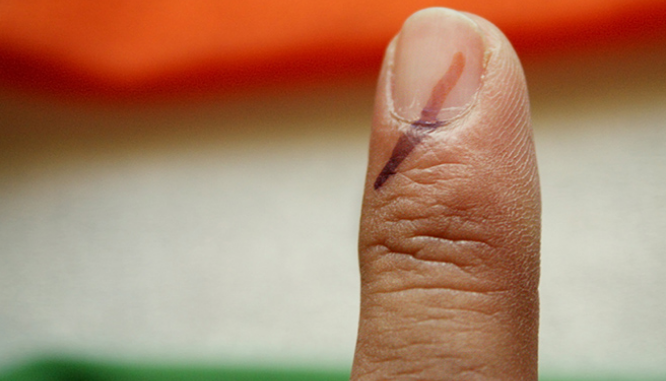
Recently, the Election Commission of India (ECI) has said that it was ready “administratively” to conduct simultaneous elections as part of the ‘one nation, one election system’.
The CEC said that the legislature has to take a final call on this issue, which is being discussed from last couple of years.
What is “One-nation, One-poll” ?
“One-nation,One Election” is holding simultaneous or synchronised elections in which voters can exercise their separate choices for both Assembly and Lok Sabha polls in one outing.
Previous position:
Independent India began its exercise of universal adult franchise in 1951-52, with the Lok Sabha and state Assembly elections held simultaneously. This continued till exigencies cropped up after 1967. Some assemblies were pre-maturely dissolved; later the Lok Sabha met the same fate, which meant that the Houses had to be constituted at different timings. Creation of new states added to the necessity. Thus unfolded ‘one nation, many elections‘ kind of system.
Present position:
The non-stop cycle of general elections has provoked to call for ‘One Nation, One Election‘. Besides our present PM and former President Pranab Mukherjee, key institutions like the Parliamentary Standing Committee, Election Commission, Law Commission and Niti Aayog have advocated for one nation, one election.
Why ‘One Nation, One Election’?:
The decision to hold parliamentary and the state assembly polls at the same time does not fall in the ambit of the ECI.
Urban apathy in metros is a major concern. The low voting percentage, especially in urban areas considered educated and prosperous is a matter of concern, which should change in a vibrant democracy like India. The continuous cycle of elections result in politics being seen in everything while development works suffer.
e.g., Pune city had registered less than 50% voter turnout in the 2019 LS elections and had seen a similarly low turnout in the state assembly polls the same year.
Secondly, with one or other election being held at regular intervals, all political parties remain “election machines all the time”.
Thirdly, it also causes wastage of public money and hampers development work. People, too, become unenthusiastic towards this “festival of democracy” due to frequent elections.
Simultaneous polls will also save on deployment of security forces — whether it is the local police, paramilitary forces or, in some cases, the army — for the peaceful conduct of elections. This will, in turn, ensure greater attention to maintaining law and order within the country as well as security on the borders.
Who will have the advantage?
It is said that it will have “No Advantage to Any”.
A valid anxiety is that in combined polls, a central narrative could overwhelm marginal aspirations and take it all, thus hurting the federal-essence of democracy. Data, of course, suggests that in simultaneous elections, people tend to press both buttons for the same party, but not always, and not necessarily for national outfits. Odisha offers few interesting pointers. In 2014, regional preference clearly influenced national choice in the state. The 2019 verdict, however, suggested that voters can vote differently for national and state polls even while voting together.
Bottlenecks in having ‘one nation, one election’:
There are stiff constitutional, legal and logistic terrains to cover on way to simultaneous polls. The Election Laws Amendment Act, 2021, which aims to have a cleaner and updated electoral roll by availing the Adhaar system and effecting quarterly registration of voters is a step in the right direction.
The larger task is parliamentary and political. A whole basket of constitutional provisions and statutes that deal with duration and dissolution of the Lok Sabha and state Assemblies and parts of the Representation of the People Act will need change. Extension or curtailing of Assembly tenures may become a necessity, and imaginative provisions are needed to pre-empt possible political disruptions mid way.
It is also being argued that the holding of simultaneous elections would inevitably kill the representative character of Indian democracy. It might create more space for authoritarian tendencies to grow, favour national parties and their agendas — that would, by nature of their national character, get greater attention from the media compared with the regional parties. Many of the latter came into being because the Congress was unable to address local aspirations; these parties and their electoral dynamics are a major reason why elections that were clubbed together after Independence, gradually got de-linked by the time the fourth general elections were held in 1967.
About Classic IAS Academy
Classic IAS Academy is one of the best online upsc coaching in Delhi. Our aim is to help brilliant minds of the country to become civil servants and make them leaders of the future who can take the nation forward. Our two UPSC preparation institutes are located in Bhikaji Cama Place and Karol Bagh, Delhi provide comprehensive coaching programme for civil services aspirants right from preliminary stage to interview stage. Classic IAS Academy is one of the finest IAS Coaching Center in Delhi

Leave a Reply
You must be logged in to post a comment.